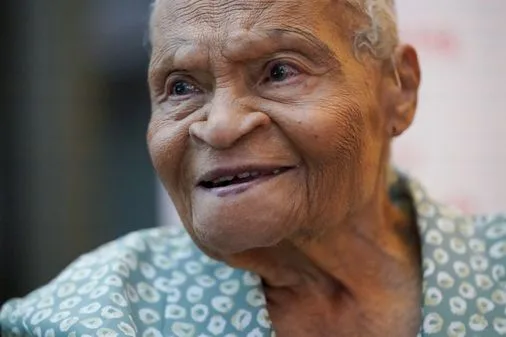
For 102 years, Viola Ford Fletcher has been waiting for justice. Last week, it was again denied.
An Oklahoma judge dismissed a lawsuit for reparations filed by Fletcher, Lessie Benningfield Randle, and Hughes Van Ellis, the last three known survivors of the 1921 Tulsa Race Massacre, one of this nation’s worst racist atrocities. Fletcher, who is the oldest, was 7 when the Greenwood district, where about 10,000 Black people lived, worked, and thrived, was reduced to rubble and ash by white domestic terrorists.
Homes and businesses were torched. Black people were slaughtered, their bodies dumped into unmarked mass graves. Those who escaped received no recompense for what was violently taken from them, erasing hard-earned generational wealth.
Responding to the lawsuit, Oklahoma officials argued compensating survivors would be too great a financial burden for the state and city to bear. Tulsa County District Court Judge Caroline Wall dismissed the case “with prejudice,” meaning the ruling is final and the case can’t be refiled in court. But attorneys for the survivors say they will appeal to the Oklahoma Supreme Court.
“The dismissal of this case is just one more example of how America’s — and specifically Tulsa’s — legacy of racial harm, racial distress is disproportionally and unjustly borne by Black communities,” Damario Solomon-Simmons, the survivors’ lead attorney, said during a Monday news conference. “We will not rest until there’s justice for Greenwood.”
During the 2020 global protests sparked by George Floyd’s murder by a Minneapolis police officer, there was cautious hope that some justice would be possible for the Tulsa survivors. In 2021 — four months after violent white supremacists breached the US Capitol — Fletcher sat in that same space and spoke of the racist horrors she witnessed a century earlier during the Tulsa Race Massacre.
“I will never forget the violence of the white mob when we left our home. I still see Black men being shot, Black bodies lying in the street,” said Fletcher, whose memoir about the massacre, “Don’t Let Them Bury My Story: The Oldest Living Survivor of the Tulsa Race Massacre In Her Own Words,” is scheduled to be published in August.
Fletcher said she still smells the smoke and sees the fires that consumed Greenwood. She hears the roar of the planes and the echoes of the residents’ last gasps and screams.
“I am here seeking justice,” said Fletcher, then 107. “I am here asking my country to acknowledge what happened in Tulsa in 1921.”
After decades of silence and exclusion from the history books, there was national recognition. When President Biden visited Tulsa during the massacre’s centennial remembrance in 2021, he pointed out that he was the first president ever “in this place, in this ground, to acknowledge the truth of what took place here.”
While acknowledgement is necessary, it is not restitution. Acknowledging what happened in 1921 neither recognizes nor addresses how the flames of white supremacy that devoured a community once known as “Black Wall Street” continue to burn. Acknowledgement isn’t the accountability that Tulsa survivors are owed.
And it’s not as if this nation has never paid reparations to people who believed they deserved recompense for property lost and their quality of life damaged. When President Abraham Lincoln signed the District of Columbia Emancipation Act in 1862, ending slavery in the nation’s capital, it also paid slaveowners loyal to the union up to $300 for every enslaved Black person freed.
Slaveowners received reparations in real time. Meanwhile, Tulsa survivors have been fighting for decades. In 1937, lawsuits filed on behalf of the massacre victims and survivors who lost personal property were also dismissed.
All the talk of a racial reckoning in 2020 was just that — talk. Many white people didn’t mind putting Black Lives Matter signs on lawns or in windows because the symbolism cost them nothing and offered no real risk of tangible societal change. In its way, performative acts of social justice are their own kind of violence. They raise hopes, only to dash them. They make prayers into promises and deliberately leave them unfulfilled.
Ryan Walters, Oklahoma’s superintendent of public instruction, even tried to recently deny that “skin color” had anything to do with the Tulsa Race Massacre.
During the recent Republican-created debt ceiling crisis, Treasury Secretary Janet Yellen said, “The US has always paid its bills on time” and “The US has never defaulted.” But for more than 150 years, this nation has defaulted on debts owed to Black people, including the Tulsa Race Massacre survivors — all now centenarians. They waited so long to tell their stories. Now because of a judge in Oklahoma, they must continue to wait for even a sliver of justice.
Renée Graham is a Globe columnist. She can be reached at renee.graham@globe.com. Follow her on Twitter @reneeygraham.


